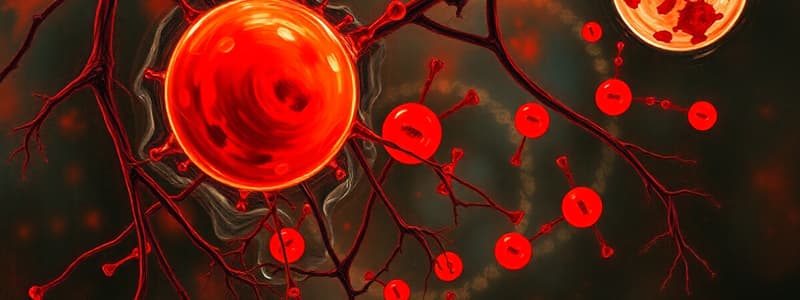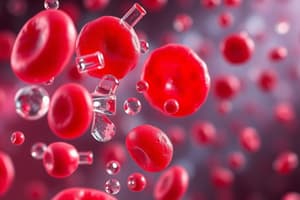Podcast
Questions and Answers
What is one of the primary functions of blood in the body?
What is one of the primary functions of blood in the body?
- Synthesizing proteins
- Transportation of nutrients to cells (correct)
- Regulating hormonal levels
- Producing energy from glucose
Which type of white blood cell is primarily responsible for responding first to bacterial infections?
Which type of white blood cell is primarily responsible for responding first to bacterial infections?
- Monocytes
- Neutrophils (correct)
- Basophils
- Lymphocytes
What is the approximate percentage of red blood cells in whole blood?
What is the approximate percentage of red blood cells in whole blood?
- 10-20%
- 80-85%
- 70-75%
- 40-45% (correct)
Which type of white blood cell is primarily associated with allergic reactions?
Which type of white blood cell is primarily associated with allergic reactions?
What role do platelets play in the blood?
What role do platelets play in the blood?
What binds to hemoglobin in red blood cells?
What binds to hemoglobin in red blood cells?
Which type of blood cell is involved in regulating the immune response?
Which type of blood cell is involved in regulating the immune response?
What is the main function of plasma in the blood?
What is the main function of plasma in the blood?
Which white blood cells are responsible for cleaning up dead cells?
Which white blood cells are responsible for cleaning up dead cells?
What is not a role of blood in the body?
What is not a role of blood in the body?
Flashcards are hidden until you start studying
Study Notes
Functions of Blood
- Transports oxygen, nutrients, and antibodies to cells and tissues.
- Carries waste products to the liver and kidneys for elimination.
- Regulates body temperature through heat distribution.
- Forms blood clots via fibrin to control bleeding.
Types of White Blood Cells (WBCs)
- Neutrophils: First responders to bacterial and viral infections.
- Eosinophils: Involved in allergic reactions and asthma responses.
- Basophils: Role in inflammatory reactions and the release of histamine.
- Monocytes: Clean up dead cells and produce antibodies.
- Lymphocytes: Fight infections by producing antibodies and regulating immune responses.
Components of Blood
-
Red Blood Cells (RBCs): Also known as erythrocytes, comprise 40-45% of whole blood (hematocrit).
- Anucleated cells (lack a nucleus).
- Hemoglobin within RBCs binds to oxygen and carbon dioxide.
-
White Blood Cells (WBCs): Comprise about 1% of total blood volume, crucial for immune function.
- Neutrophils: Most common type, primarily fight bacteria.
- Lymphocytes: Second most common type, regulate immune responses and attack infections.
Studying That Suits You
Use AI to generate personalized quizzes and flashcards to suit your learning preferences.



